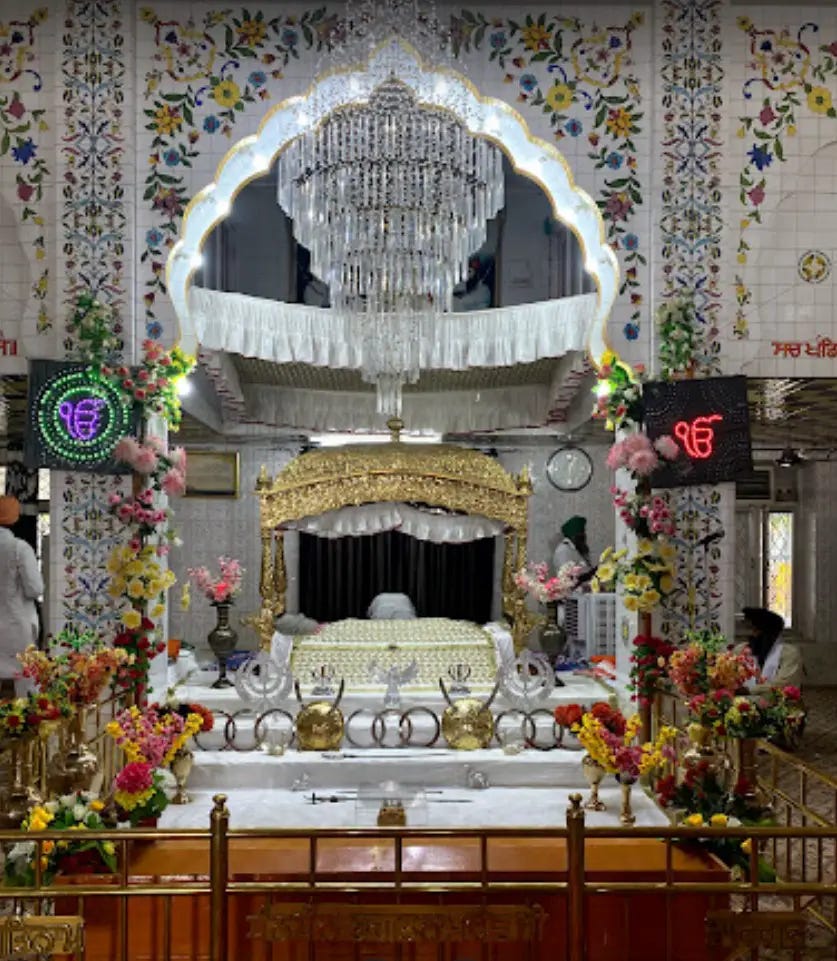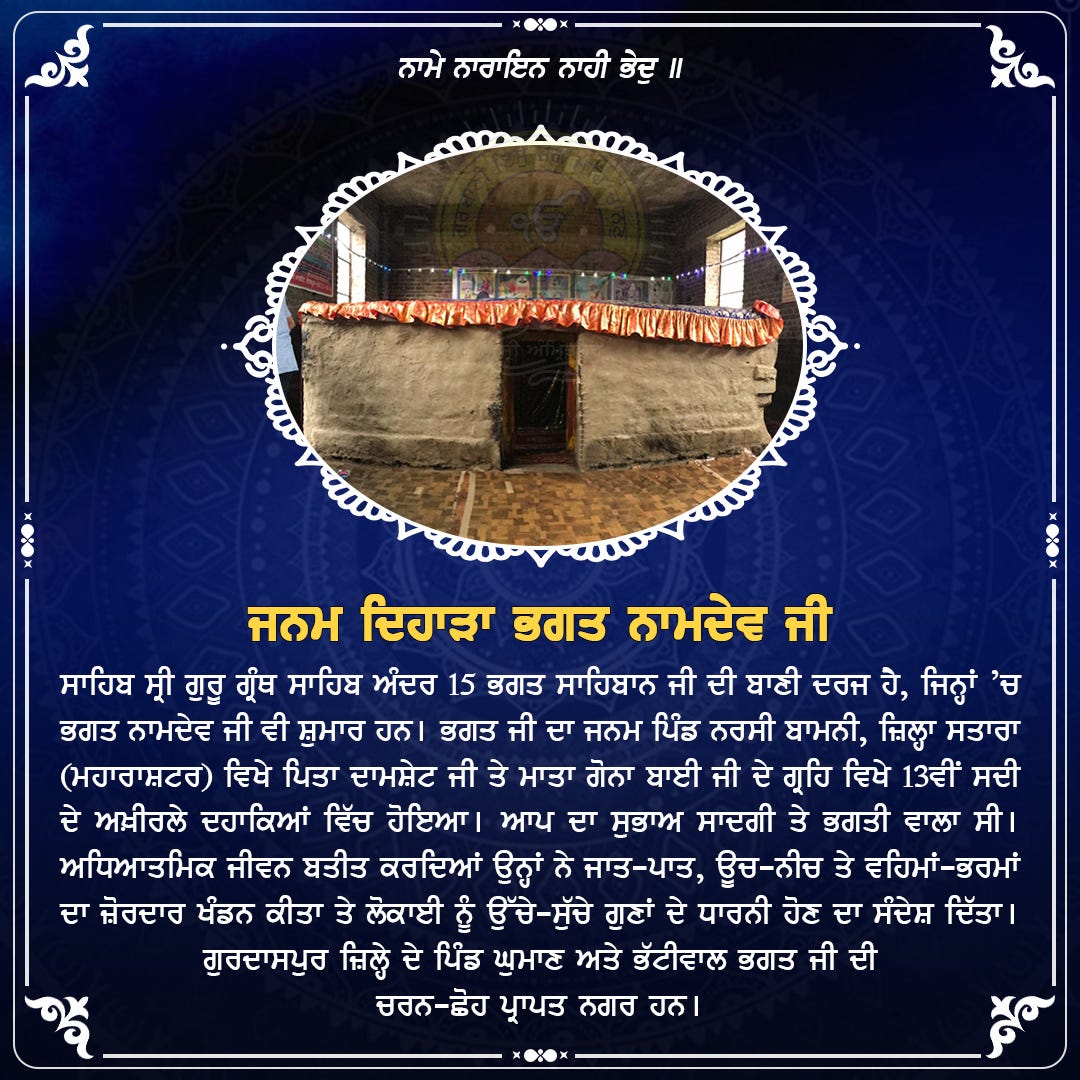Commemorating Bhagat Namdev Ji on his Birth Anniversary
Sri Guru Arjan Dev Ji accorded a supreme honour to Bhagat Namdev Ji by including 60 of his verses in Sri Guru Granth Sahib, thereby immortalizing his compositions in the core of Sikhism.
The Auspicious Birthday and his Words in the Eternal Sri Guru Granth Sahib
Today, we celebrate the auspicious birthday of Bhagat Namdev Ji, a saint whose profound wisdom and devotion are eternally embedded in Sikhism's holiest scripture, the Sri Guru Granth Sahib (SGGS), revered as the living Guru. Bestowed with the supreme honour by Sri Guru Arjan Dev Ji, Bhagat Namdev's verses shine a guiding light for every Sikh, touching the hearts of spiritual seekers worldwide. His contributions, comprising over 60 hymns, stand as a testament to his spiritual eminence and enduring impact on Sikh philosophy.
Bhagat Namdev Ji: A Beacon of Devotion and Equality
Born into the Chhimba caste (a community of dyers) in Maharashtra in 1270 AD—a social group then considered lowly—Bhagat Namdev Ji's life journey, spanning eight decades until 1350 AD, is a resounding affirmation of simplicity, devotion, and spiritual fortitude. His formative years, nurtured within a devout family environment, set the stage for his seminal role in the Bhakti movement. Namdev Ji's teachings, steeped in the principles of universal love and unity, boldly challenged and surmounted the entrenched barriers of caste and creed. His profound influence was particularly notable in Maharashtra and Punjab, where he profoundly shaped the religious and social landscape.
As a revered spiritual figure, his contributions to Sikhism, immortalized in the Sri Guru Granth Sahib, continue to enlighten and guide millions globally. His life's work and philosophy, encapsulating the core of the Bhakti movement, stand as an enduring call for spiritual awakening and societal unity.
Language and Expressions: The Medium of the Commoner
Bhagat Namdev Ji's verses, originally composed in Marathi, exude a simplicity and directness that deeply connects with the heart. His decision to use Marathi, a stark departure from the scholarly Sanskrit of the time, rendered his teachings accessible to the everyday person, thereby broadening the reach of his message of devotion and equality. While these verses are presented in Punjabi (Gurmukhi script) in the Sri Guru Granth Sahib, their essence has been faithfully preserved by Sri Guru Arjan Dev Ji during their adaptation for what was then known as the Adi Granth. This careful preservation ensures that the core of Namdev Ji's original compositions resonates through the ages, transcending linguistic boundaries while maintaining their spiritual profundity.
Triumph of Spiritual Devotion: Bhagat Namdev Ji at Aundha Nagnath Temple
A Test of Faith Amidst Discrimination
In a widely recounted episode emblematic of his deep devotion and divine grace, Bhagat Namdev Ji's pilgrimage to the Aundha Nagnath Temple, revered as one of the 12 Jyotirlingas, situated in today's Hingoli district of Maharashtra, is a poignant chapter in his spiritual odyssey. This ancient shrine, dedicated to Lord Shiva, became the stage for a moment of profound spiritual affirmation amidst societal turmoil. Confronted with the rigidities of the caste system, Namdev Ji faced severe discrimination; he was unjustly ousted from the temple by the priests, who judged him solely on his social status and caste. This incident, deeply etched in the Sikh lore, underscores the societal adversities he endured, transforming into a powerful testament of his unshakable faith and divine support.
Devotion Beyond Boundaries: The Temple Turns
Unfazed by the disdain and exclusion, Bhagat Namdev Ji, filled with unwavering devotion, continued his worship the Lord at the rear of the temple. In his profound verses, recorded in the Sri Guru Granth Sahib (Ang 1164), he poured out his deep anguish as well as steadfast faith in the Divine. Amidst these moments of intense devotion and surrender, a miraculous phenomenon is said to have unfolded: the temple, it is widely believed, reoriented itself, turning towards Namdev Ji, thereby symbolically turning its back on the biased priests. This extraordinary occurrence not only validates his deep devotion but also stands as a potent emblem against societal prejudice, highlighting the divine's disregard for human-imposed social divisions.
The Legacy and the Verses in Gurmukhi
The architectural distinctiveness of the Aundha Nagnath Temple, especially its westward-facing design and the positioning of its water pool (kuub) at the back, diverging from the traditional east-facing orientation of Hindu temples, serves for many of his devotees as a tangible affirmation of this legend. This unique layout defies conventional temple architecture, symbolizing the boundless love of the Divine for his true devotees, transcending the confines of human-created divisions. The emotionally charged and spiritually profound verses penned by Namdev Ji, reflecting on this significant episode, are immortalized in the Guru Granth Sahib, offering insight into his deep devotion and the miraculous nature of this event.
The original verses, in Raag Bhairo, in Gurmukhi, along with their translations, offer a glimpse into his soul-stirring devotion:
ਹਸਤ ਖੇਲਤ ਤੇਰੇ ਦੇਹੁਰੇ ਆਇਆ ॥
Hasath Khaelath Thaerae Dhaehurae Aaeiaa || (Laughing and playing, I came to Your Temple, O Lord.)
ਭਗਤਿ ਕਰਤ ਨਾਮਾ ਪਕਰਿ ਉਠਾਇਆ ॥੧॥
Bhagath Karath Naamaa Pakar Outhaaeiaa ||1|| (While Naam Dayv was worshipping, he was grabbed and driven out.) ||1||
ਹੀਨੜੀ ਜਾਤਿ ਮੇਰੀ ਜਾਦਿਮ ਰਾਇਆ ॥
Heenarree Jaath Maeree Jaadhim Raaeiaa ||(I am of a low social class, O Lord;)
ਛੀਪੇ ਕੇ ਜਨਮਿ ਕਾਹੇ ਕਉ ਆਇਆ ॥੧॥ ਰਹਾਉ ॥
Shheepae Kae Janam Kaahae Ko Aaeiaa ||1|| Rehaao || (Why was I born into a family of fabric dyers?) ||1||Pause||
ਲੈ ਕਮਲੀ ਚਲਿਓ ਪਲਟਾਇ ॥
Lai Kamalee Chaliou Palattaae || (I picked up my blanket and went back),
ਦੇਹੁਰੈ ਪਾਛੈ ਬੈਠਾ ਜਾਇ ॥੨॥
Dhaehurai Paashhai Baithaa Jaae ||2|| (To sit behind the temple.) ||2||
ਜਿਉ ਜਿਉ ਨਾਮਾ ਹਰਿ ਗੁਣ ਉਚਰੈ ॥
Jio Jio Naamaa Har Gun Oucharai || (As Naam Dayv uttered the Glorious Praises of the Lord,)
ਭਗਤ ਜਨਾਂ ਕਉ ਦੇਹੁਰਾ ਫਿਰੈ ॥੩॥੬॥
Bhagath Janaan Ko Dhaehuraa Firai ||3||6|| (The temple turned around to face the Lord's humble devotee.) ||3||6||
These verses, embodying Namdev Ji's deep spiritual resonance and his challenge to societal norms based on caste and creed, continue to inspire and remind us of the unyielding power of true devotion and the transcendent nature of divine love.
The Sanctified Sites: Temples and Gurdwaras
Bhagat Namdev Ji's teachings and life are celebrated in numerous temples and Gurdwaras, with a prominent one being the Gurdwara Bhagat Namdev Ji Sahib in Ghuman, near Sri Hargodindpur in Gurdaspur district of Punjab. These sacred spaces serve as beacons of his enduring spiritual legacy, attracting devotees and scholars alike.

The Final Sojourn and Eternal Legacy of Bhagat Namdev Ji
Embarking on a spiritual journey across India with Sant Dyaneshwar, Bhagat Namdev Ji traversed the diverse landscapes of the Indian subcontinent, imbuing his path with profound devotion. Following the departure of Sant Dyaneshwar from this world, Bhagatji found solace and spiritual refuge in the peaceful village of Ghuman, nestled in the Gurdaspur district of Punjab. There, in the lap of serene surroundings, he devoted 18 years to deep meditation. This period marked a significant phase in his life, characterized by prolific spiritual compositions. Many of his hymns, now an integral part of the Sri Guru Granth Sahib Ji, are believed to have been penned in Ghuman, echoing his deep spiritual insights and unwavering devotion.
In 1350, Bhagat Namdev Ji's earthly sojourn reached its zenith as he merged into the infinite. His departure left behind a treasure trove of spiritual teachings and hymns, continuing to enlighten and inspire souls globally. The tranquil village of Ghuman, where he spent these pivotal years, has since become a revered site of pilgrimage. It stands as a living testament to Bhagatji's enduring influence and a beacon of his profound spiritual legacy.
Gurudwara Shri Bhagat Namdev Ji Sahib, Ghuman
In this sacred village rests the Gurudwara Shri Bhagat Namdev Ji Sahib, a sanctum of reverence and remembrance, overseen, not by the SGPC Amritsar, but by a dedicated local committee. The local committee, comprising members of the Sikh community, shoulders the responsibility for the gurdwara's daily administration, upkeep, and religious activities. This local stewardship of the gurdwara at Ghuman reinforces the community's deep connection to Bhagat Namdev Ji's legacy, while maintaining the overall supremacy of Sri Guru Granth Sahib.
Bhagat Namdev ji’s Timless Message and Legacy
As we commemorate Bhagat Namdev Ji's birthday, we not only celebrate his remarkable life journey but also delve into the profound wisdom of his verses. His transition from a devout seeker, confronting societal challenges, to a revered saint in Sikh history, exemplifies resilience, unwavering faith, and divine communion. His legacy, resonating across generations, serves as a timeless reminder of the transcendent power of devotion, cutting across worldly barriers and uniting hearts in spiritual oneness.










Guru Arjan Dev ji included the works of 14 bhagats in Guru Granth Sahib. We have contributions from 11 bhatts, 1 sufi and 3 Gursikhs in SGGS. Our Gurus acknowledged the works and beliefs of bhagats of those times...unlike our leadership which has been pushing for our "segregation" from the wider society in India.